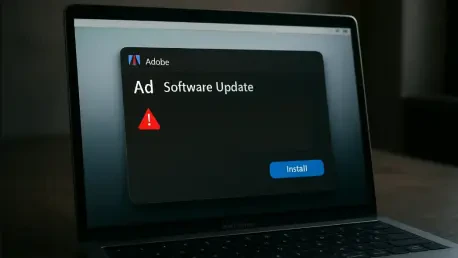Imagine running a thriving e-commerce business, only to discover that a hidden flaw in your platform could allow attackers to seize control of customer accounts or even execute malicious code without detection. This alarming scenario became a reality for users of Adobe Commerce and Magento with the recent unveiling of a critical vulnerability known as SessionReaper. With a severity score of 9.1, this flaw has sent shockwaves through the online retail community, prompting urgent action from vendors and security teams alike. This roundup gathers perspectives from industry reports, security advisories, and expert analyses to explore the depth of the threat, the response strategies, and the steps businesses must take to protect their digital storefronts.
Uncovering the SessionReaper Threat in Magento and Adobe Commerce
The discovery of SessionReaper, a severe vulnerability in Adobe Commerce and Magento platforms, has raised significant concerns among e-commerce stakeholders. Flagged by threat researchers on September 8, this flaw poses risks of customer account takeovers and potentially unauthenticated remote code execution (RCE). The urgency surrounding this issue stems from its capacity to compromise sensitive user data and disrupt online operations on a massive scale.
Insights from security teams highlight the critical nature of this vulnerability, affecting multiple versions of the platforms. Reports suggest that the flaw, centered on improper input validation, could allow attackers to hijack active user sessions, leading to breaches in data confidentiality and integrity. This has sparked a broader discussion on how such vulnerabilities expose systemic risks in widely used e-commerce systems.
The response from Adobe, including an emergency patch, underscores the immediate need for action. However, varying accounts of the threat’s full scope—particularly regarding the unaddressed risk of RCE—have led to debates within the security community. This roundup aims to distill these perspectives, offering a clear view of the dangers and the necessary countermeasures for affected businesses.
Breaking Down the Severity of SessionReaper: Diverse Opinions
A Critical Flaw with Devastating Potential
SessionReaper stands out as a particularly dangerous vulnerability, with a CVSS score of 9.1 reflecting its high severity. Security advisories confirm that this improper input validation issue impacts a wide range of Adobe Commerce and Magento versions, creating pathways for attackers to exploit active sessions. Such capabilities could result in significant breaches, threatening both business operations and customer trust.
Further analysis from industry reports emphasizes the potential for severe compromises to data integrity. While official advisories focus on session hijacking as a primary concern, some security researchers argue that the possibility of remote code execution adds an even graver dimension to the threat. This discrepancy has fueled discussions about whether the full extent of the risk is being communicated to users.
The consensus among experts is that the vulnerability’s impact could be catastrophic if left unaddressed. With e-commerce platforms handling sensitive financial and personal data, the stakes are incredibly high. This situation calls for a unified understanding of the flaw’s capabilities to ensure that protective measures are both comprehensive and effective.
Historical Context: SessionReaper in Perspective
Comparing SessionReaper to past vulnerabilities in Magento provides a sobering context for its severity. Issues like Shoplift from a decade ago and more recent flaws like CosmicSting have shown how quickly attackers can exploit disclosed weaknesses. Historical data indicates that thousands of online stores have been compromised within mere hours of such vulnerabilities becoming public knowledge.
Security analysts point out that this pattern of rapid exploitation creates a precedent for concern with SessionReaper. Although no active attacks have been reported at this time, the accidental early release of Adobe’s patch details has heightened fears that malicious actors might already be developing exploit code. This historical lens underscores the narrow window businesses have to act.
The recurring nature of these critical flaws in e-commerce platforms also prompts broader questions about long-term security. Some industry voices suggest that while SessionReaper is a significant threat, it mirrors a persistent challenge in software development where rapid growth often outpaces robust security measures. This perspective urges a reevaluation of how platforms prioritize vulnerability management.
The Ticking Clock: Urgency from All Angles
The timeline for addressing SessionReaper is alarmingly short, according to security warnings. With details of the patch inadvertently leaked, there’s a strong possibility that attackers are racing to weaponize the vulnerability. This sense of urgency is echoed across multiple reports, which stress that delayed action could lead to widespread exploitation.
E-commerce businesses, particularly those in high-traffic markets, face amplified risks of customer data breaches and operational downtime. Analysts argue that the global reach of Adobe Commerce and Magento means that a single successful exploit could have cascading effects across industries. This looming threat has shifted the conversation toward immediate, decisive responses over cautious deliberation.
Challenging the notion that patching can be postponed, many in the security field highlight that historical trends show exploitation often occurs faster than expected. The consensus is clear: businesses must treat this as a critical priority. Differing opinions on the exact speed of potential attacks only reinforce the need for preemptive measures to safeguard digital assets.
Behind Adobe’s Emergency Response: Varied Reactions
Adobe’s swift deployment of an emergency patch on September 9 has been met with both praise and scrutiny. Security updates indicate that internal discussions about the fix began well before public disclosure, with select customers receiving early notifications. This proactive step has been lauded by some as a responsible move to mitigate risks before widespread awareness.
However, not all feedback aligns with this positive view. Certain security reports express concern that Adobe’s official communications may underplay the vulnerability’s full scope, particularly by omitting mentions of remote code execution risks. This gap between official advisories and independent findings has led to calls for greater transparency in how such threats are reported to users.
Broader industry reflections suggest that Adobe’s approach mirrors a common struggle in software security: balancing rapid response with thorough disclosure. While some experts commend the speed of the patch release, others argue that incomplete information could hinder businesses’ ability to fully grasp the threat. This debate reveals the complexity of managing critical flaws in real-time.
Protecting Your Business: Collective Tips for Mitigation
The dangers posed by SessionReaper—from session hijacking to potential remote code execution—demand immediate attention, as agreed upon by various security sources. The primary recommendation across the board is to deploy Adobe’s official patch without delay. Accompanying developer guides provided by the vendor are highlighted as essential tools to ensure proper implementation without disrupting existing systems.
For those unable to patch immediately, temporary solutions like enabling a Web Application Firewall (WAF) are widely advised as a stopgap measure. Additionally, rotating cryptographic keys is suggested for businesses concerned about prolonged exposure. These interim steps, while not substitutes for the patch, offer a layer of defense during urgent situations, according to security insights.
Practical advice also extends to post-patching actions, with many experts recommending malware scans for systems updated after initial disclosure periods. Testing integrations to prevent operational hiccups is another frequently mentioned tip. These combined strategies, drawn from diverse analyses, provide a robust framework for businesses to shield their e-commerce platforms from this critical threat.
The Bigger Picture: Securing E-Commerce Platforms
SessionReaper serves as a stark reminder of the vulnerabilities inherent in widely adopted e-commerce systems like Adobe Commerce and Magento. Insights gathered from multiple sources reveal a shared concern about the persistent nature of such flaws, emphasizing that proactive security must remain a priority for businesses. The discussions underscore how quickly threats can evolve once patches or vulnerabilities become public knowledge.
Looking back, the varied perspectives on transparency and response speed offer valuable lessons for the industry. The collective wisdom points toward a need for stronger collaboration between vendors and security researchers to ensure comprehensive threat communication. This incident also highlights the importance of building resilient systems that can withstand sophisticated attacks.
Moving forward, businesses are encouraged to invest in ongoing security training and to stay updated on emerging threats through reliable industry resources. Establishing partnerships with security providers for real-time protection is another actionable step that surfaced from the roundup. By taking these measures, companies can better prepare for future challenges and maintain trust in an increasingly complex digital landscape.









